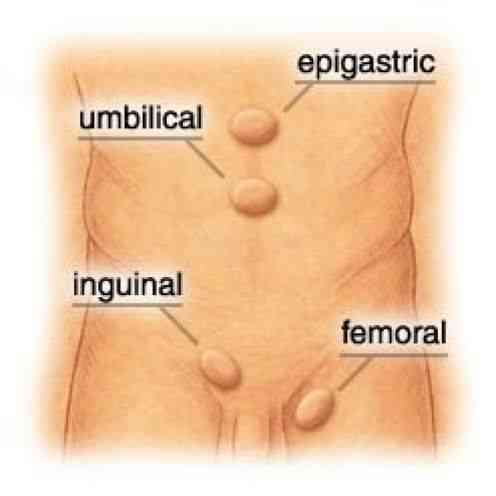Hernia Surgery Recovery Tips: The Complete Guide
Hernias are not uncommon. They can affect men and women of all ages.
In our Hernia Surgery Recovery Guide, we share everything you need to know to prepare for the surgery and help make the process easier for you and your loved ones.
What is a Hernia?
A hernia is a a hole in the muscular abdominal wall. The tissue inside of the abdomen protrudes through the muscles of the abdominal wall which can cause significant discomfort or pain. There is also a risk of the intestine becoming caught (incarcerated in the abdominal wall hole or defect. This can lead to an emergency obstruction of the bowel or strangulation of the contents within the hernia.
A hernia can occur in many different locations in the muscular abdominal wall. The most common types of hernias are shown below.
What are the Different Types of Hernia?

- Inguinal
- Femoral
- Umbilical
- Epigastric
- Incisional
- Ventral Incisional

What to Do Before Surgery
The preparation for hernia surgery is usually a relatively minimal task.
Cigarette smoking and other forms of tobacco use should be stopped a month prior to surgery.
If one is overweight, optimization of weight to achieve a normal BMI is most beneficial in enhancing outcomes.
A few days before hernia surgery, the surgeon may ask you to stop taking certain medications.
The medications of significant concern to be discussed with the surgeon are blood thinners such as Plavix, Brilinta, Coumadin, Eliquis, Xarelto or Pradaxa. There will be individualized directions about when to stop and restart the medication.
The surgeon also needs to know if you are allergic to any specific medications.
The days before surgery, many patients feel anxious or nervous about their upcoming procedure
This is a common feeling among people facing surgery in the near future.
Focusing on how much better you will feel and look without the hernia is a great way to eliminate any nervous feelings.
Additional suggestions before hernia surgery include:
- Most important is to be mindful of your goal to eradicate your hernia.
- Remind yourself of all the benefits of having your hernia repaired.
- Optimize your nutrition and hydration for the weeks preceding your repair.
- Quit smoking - smoking has been shown to increase the risk of problems during and after your operation.
Hernia Recovery Time
The time it takes to perform hernia surgery depends on the
type of procedure that is being done.
Some smaller hernias can be repaired in under 30 minutes and some require 3-4 hours to properly complete the procedure.
The experience after hernia surgery varies among different types of hernias and different people. It is normal to feel pulling, tension, or other sensations in the surgical area as you heal. You may also experience mild to moderate pain. About 5% of patients will experience severe pain and prescription pain medicine may be appropriate to use in these cases.
The duration of time until one feels “back to normal” varies from a week to a few months.
What Should I Expect Post-Surgery?
Anesthesia will wear off after surgery, but it may take up to 24 hours for it to completely leave your system and for all of the medication to be flushed from your body.
Your experience after surgery again depends on the type of hernia and technique used for the repair. Many smaller and simpler hernias are repaired in an outpatient surgery center (sometimes known as an “ambulatory surgery center”).
Larger and more complicated hernias may require a hospital stay that usually varies between 1-4 night stay.
There is usually some degree of pain after any hernia operation. Surgical experience and expertise contributes to minimizing pain and discomfort after surgery.
Management of the pain or discomfort after surgery is often achieved with non-prescription pain medication.
You may also notice pink or reddish drainage, bruising or slight swelling around the incision. This is normal and not cause for concern.
Additional normal
expectations include:
- Feeling tired.
- Slight bloating.
- Low or no appetite.
- Constipation.
Generally, these post-surgical symptoms will last a couple of days to about 2 weeks, depending on the surgery and your overall health.
Recovery from Hernia Surgery:
How Much Time is Required for Normal Activities?
Individuals who have undergone hernia surgery usually experience a variety of symptoms such as pain, instability, and/or discomfort in the area where the incision was made.
There really is no set number for this and every person and their hernia have unique nuances.
For most people, one should plan on “taking it easy” for about two weeks after surgery.
You are likely to have pain for a few days. You may also feel tired and have less energy than normal.
In most cases, you can expect to feel much better in about 7 days.
Returning to a desk job is often possible within 7 – 14 days.
Returning to a physically demanding job varies by the type of hernia repaired and the location of the hernia repaired.
Dos and Don’ts After Hernia Surgery
It is important to keep in mind that following a hernia surgery, there are certain things that you should avoid and other things you can do to maintain your well-being post-surgery.
Lifting
YES! You can lift things – How much? – Your baseline strength and type of repair would dictate this.
One should consider avoiding things that stress the area of surgery.
Moving Around
One should consider avoiding things that stress the area of surgery.
A groin hernia repair patient likely should avoid movements like squats or lunges with any significant weights.
An abdominal ventral hernia repair patient should likely be avoiding movements like sit ups for some period of time.
Showering/Bathing
Most patients that have hernia surgery will be able to shower or bathe within 24 - 48 hours of surgery.

4 Tips to Help You Speedup Your Hernia Recovery Time
Hernias are a common surgical procedure. Recovery time can be long, depending on the severity of your hernia and your general health.
Since a hernia is a surgical event, it’s important to understand the process and what you can do for a quicker recovery.
Positive Attitude
Return to Physical & Cognitive Activity
While rest is important after an operation, laying around on the couch watching TV for weeks in the name of recovery can do more harm than good.
WebMD says lying in bed can trigger a host of problems --
blood clots, pressure ulcers, pulmonary embolisms, and weakening of your muscles.
Avoid Narcotics
Studies have shown that Narcotics (also called Opioids) can
slow the healing process after surgery.
Stretching Exercises
Stretching and mild exercise, once you are cleared by your surgeon, can help with circulation and reduce scar tissue.
While factors like your personal health and the type of hernia repair surgery will dictate your body's healing rate, following the advice above can help you in your recovery.
Check out the
hernia repair techniques available at the Center for Hernia Repair or request a
consultation to answer questions about your hernia.


